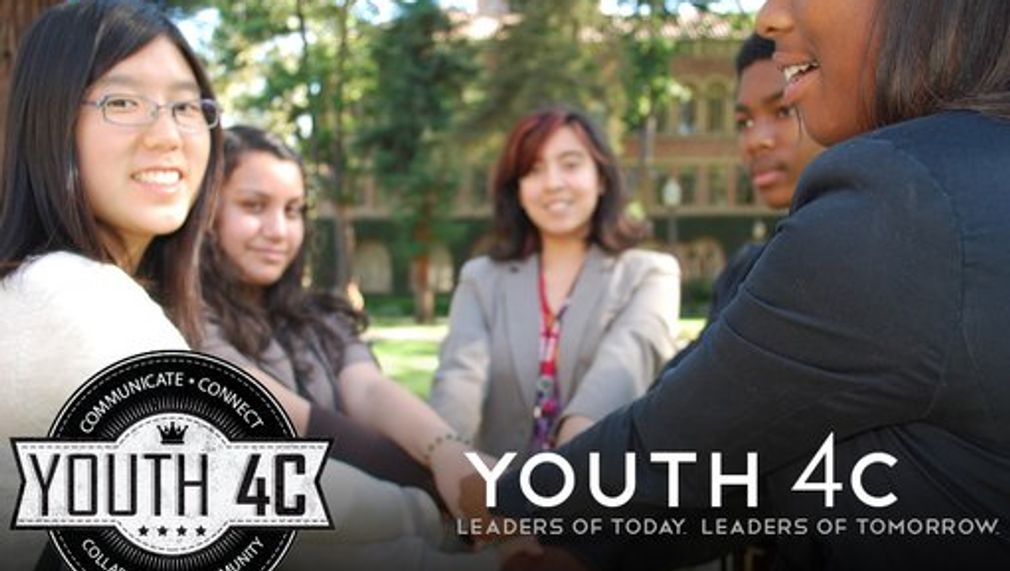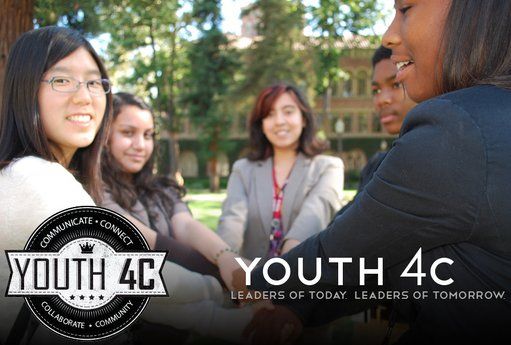Keely Hopkins & Associates
Youth 4C is a new project launched in 2013 by two young Los Angeles entrepreneurs. Having both grown up outside of Los Angeles, both Keely Hopkins and Samuel Alleyne noticed the lack of social connectedness and civic engagement among youth in L.A. , particularly among underserved communities. As a response to this, Keely Hopkins and Samuel Alleyne launched Youth 4C, a new initiative aimed at increasing leadership, advocacy, and volunteerism among youth. Instead of just focusing on preparing youth as the next generation of leaders, Youth 4C recognizes youth as the leaders of today that are capable of advocating and organizing for change in their communities.
Youth 4C is a dynamic and rapidly growing initiative that already has two projects underway in the first few months of launching. Youth 4C has developed an entrepreneur curriculum for children aged 7-15 that will be implemented this summer at Los Angeles City College. Youth 4C has also partnered with the College of the Bahamas to develop and lead an international youth summit that will bring together youth from urban and rural areas to tackle top issues affecting their futures.
Prior to launching Youth 4C, Keely Hopkins and Samuel Alleyne both came from non-profit and government relations backgrounds. Keely Hopkins, a government relations attorney and development specialist, has led statewide political campaigns, advocated on behalf of non-profits before state legislatures, and has led youth advocacy trainings in South Los Angeles. Samuel Alleyne, who specializes in project management and development strategy, comes from an extensive background in youth leadership and engagement. Samuel has served as a project coordinator the California Department of Public Health, has organized and led international youth campaigns, and has taught youth leadership and entrepreneurial classes at CSU and LACC.
Visit this organization’s website to learn more

1 Submitted Idea
- 2013 Grants Challenge
LA2050 Youth 4C Leaders

Only 7% of Los Angelenos have reported contacting a public official. 37% of Los Angelenos don’t even discuss politics at all. Even more troubling, is that not even 1 out of 12 citizens with less than a high school education will vote in a Presidential election. With voter turnout correlated to education levels, Los Angeles is losing the voice of an entire segment of people.
LA2050 Youth 4C will remove barriers that prevent civic engagement by going directly into alternative education charter schools in underserved communities to train students as grassroots leaders and advocates for community change. Over 70 students from 7 different areas in Los Angeles will be given the training and tools needed to effectively engage their peers and parents to have a voice in policy by leading campaigns in their own schools and communities. The LA2050 Youth 4C Leaders will mobilize thousands of individuals to participate in civic engagement, and for many, provide them their first experience in politics.
The LA2050 Youth 4C Initiative brings forward a new uprising of young leaders to encourage civic engagement today and help change the culture of participation for the future. The LA2050 Youth 4C Initiative is a 6-month training program that is comprised of 5 components: 1) the development and implementation of a mini-campaign at each of the seven schools; 2) production of a LA2050 Youth 4C YouTube channel that documents and share the videos of hundreds of youth discussing the issues they face; 3) a collaboration of the Youth 4C Leaders to plan and host a Back to School Conference for 2000 area students, 4) educate and engage parents at Open House sessions, and 5) leading a LA2050 Youth 4C Advocacy Day at City Hall.
Youth 4C will partner with alternative charter schools to identify and recruit 7-10 student leaders from each of the following areas: Compton, Huntington Park, Watts, Culver City, East LA, Hoover, & Hawthorne. Each group of student leaders will work as a team to develop and implement a mini-campaign at their school that focuses on one policy issue that affects their lives as students. Topics can include but are not limited to gang violence, teen pregnancy, foster care, substance abuse, access to resources, or bullying. All students will come together for monthly trainings in leadership, community organizing, and advocacy, as well as to provide a forum for discussion and support for each other’s campaigns.
After months of planning, Youth 4C Leaders will introduce their campaign at a Back to School Conference of 2000 area students. Each Youth 4C Leadership team will present their campaign to the entire conference. Each leadership team will also have a booth at the conference, allowing students to talk one on one about the issue, share campaign messages, and have supporters sign their petitions. Over the next two months, each student leadership group will embark on a community campaign at their school to gain support, have petitions signed, and to create Video Voice Mapping footage. Video Voice Mapping (VVM) is a new advocacy tool where students record themselves performing self-interviews that discusses where there are, an environmental or policy issue that is affecting them, and what they would like done about it. All videos will be placed on a newly created LA2050 Youth 4C YouTube channel that can be promoted throughout Los Angeles. Each Youth 4C Leader will perform their own VVM Interview and be responsible for interviewing 5 other students or community members. Students will also engage parents at Open House sessions, where parents will be invited to sign petitions and participate in video interviews.
As a capstone of the campaign, the student leaders will plan and host a LA2050 Youth 4C Advocacy Day at City Hall. Student leaders, friends, family members, and community supporters will come together on the steps of City Hall to show support for the future of social connectedness and civic engagement in LA. The student groups will announce the success of their project, the number of petitions that were signed, and show some of their favorite and most powerful VVM interviews. After the press conference, students will meet one on one will government officials to share their campaign.